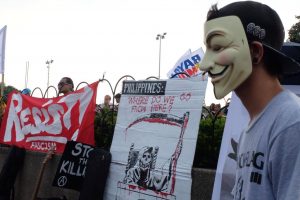When Philippine President Rodrigo Duterte was elected in 2016, the self-styled political outsider promised to kill thousands in a deadly anti-drug campaign. His fellow outsider mayors, cut off from government funding under previous dynastic administrations, saw an opportunity to finally win a president’s favor – and they did so with bloodshed.
Local mayors from independent and minority parties have driven Duterte’s deadly drug war, according to a new study, which analyzed more than one million police blotter reports and other data on extrajudicial killings throughout the Philippines. Researchers Nico Ravanilla, Renard Sexton, and Dotain Haim found that outsider-led municipalities had 40 percent more anti-drug incidents and 60 percent more police killings than cities led by members of established political parties.
The study, which is set to be published in the Journal of Politics, argues that while populists often lack the political support to implement their most radical programs, Duterte found allies in mayors and officials neglected by existing political networks.
Traditional patronage networks were thus replaced with a simple formula: Loyalty in exchange for killings.
The formula worked, according to the study: Outsider mayors performed about five percentage points better than their insider counterparts in the May 2019 midterm election, despite traditionally receiving 40 percent less in public works funds, the traditional means through which local politicians receive kickbacks. This was a reversal from previous election cycles, in which members of established parties were far more likely to win re-election.
Duterte’s allies have used their newfound political power to establish their own patronage network under the banner of his PDP-LABAN party, which mayors and other politicians have defected to en masse. That network is poised to name the presidential front-runner in the 2022 election, in which the term-limited Duterte is expected to be replaced by a close confidant such as his former aide or his daughter.
The president rose to power in 2016 following an insurgent campaign in which he toppled candidates from major parties by casting himself as a reformist outsider, free from the shackles of the political dynasties that have largely controlled Philippine politics for decades.
He has said he and his family are not indebted to patronage networks, although the Dutertes have compiled significant wealth in undisclosed business interests and the president regularly receives large monetary gifts, according to reports by the Philippine Center of Investigative Journalism and VERA Files.
But Duterte quickly needed to secure political allies to help fulfill his popular but radical campaign promises. He found them in local officials willing to carry out bloody anti-drug operations in order to win the attention and support of the president.
Duterte has also gone on the offensive against political opponents by accusing them of personally being involved in drug trafficking.
More than a dozen mayors on Duterte’s “drug list” have become victims of extrajudicial killings. Duterte’s office publicized a list of “narco-politicians” in March 2019, just before the midterm elections in May.
Senator Leila de Lima has been detained for over three years after she launched a probe into Duterte’s drug war and wound up being charged with drug trafficking herself.
Police and vigilantes who carry out extrajudicial killings have not been prosecuted, outside of a handful of high-profile cases, and Duterte has promised to protect those responsible from prosecution.
The country’s drug war has not halted during the coronavirus pandemic, which has brought the country’s economy to a standstill. In September, Human Rights Watch reported that drug war killings were up by 50 percent during the pandemic, despite the implementation of quarantines and lockdowns that are among the world’s strictest. The total death toll from the drug war is unknown, but some estimates run as high as 27,000.
Duterte and his administration have been criticized for a COVID-19 response that has been slow and ineffectual. The drug war, however, remains wildly popular – as does the president himself.
































